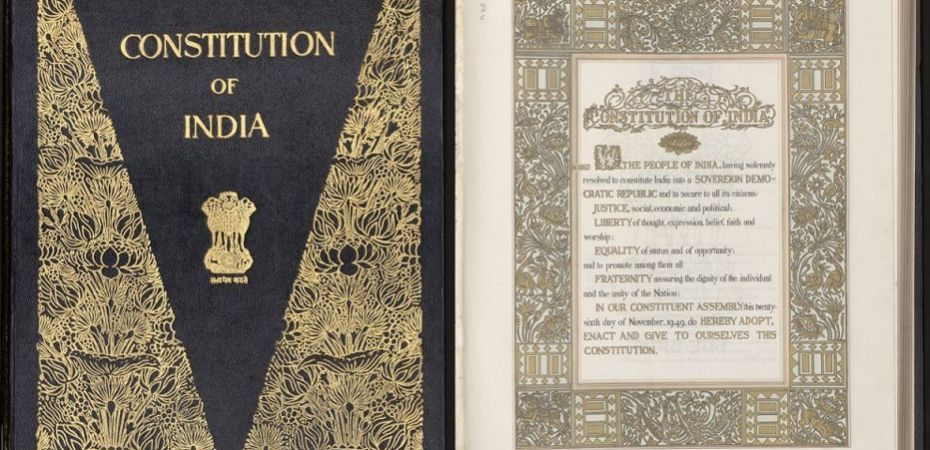Description

Copyright infringement not intended
Picture Courtesy: www.indialegallive.com
Context: The differential treatment of states in India is based on their fiscal, political, and administrative needs. The Indian Constitution has special provisions for certain states, such as Article 370 and Article 371, that give them varying degrees of autonomy.
Details
- India is a diverse and complex country with many different regions, cultures, languages and religions. The Constitution of India recognizes this diversity and grants some degree of autonomy and special status to certain states and territories, based on historical, geographical, political or cultural factors.
- These special provisions are meant to protect the rights and interests of the people living in these areas, as well as to promote their development and integration with the rest of the country.
- The Indian Constitution provides for special provisions granted to certain states under Part XXI, titled "Temporary, Transitional and Special Provisions." These provisions, while meant to be temporary, have endured for decades, sparking continuous debate and analysis.
Special Category States in India
- India is a diverse country with different states having different levels of development, resources, and challenges. Some states face more difficulties than others due to their geographical, historical, or socio-economic conditions. To address these issues and provide them with special assistance, the central government grants some states the status of Special Category States (SCS).
- The concept of SCS was introduced in 1969 by the Fifth Finance Commission, based on the Gadgil formula, to provide preferential treatment to some states in terms of central assistance and tax breaks. The criteria for granting SCS were:
- Hilly and difficult terrain
- Low population density or large tribal population
- Strategic location along international borders
- Economic and infrastructural backwardness
- Non-viable nature of state finances
- Initially, only three states - Jammu and Kashmir, Assam, and Nagaland - were given SCS, based on their security and developmental challenges. Later, eight more states - Himachal Pradesh, Manipur, Meghalaya, Sikkim, Tripura, Arunachal Pradesh, Mizoram, and Uttarakhand - were added to the list, mostly from the northeastern region. Telangana was the latest state to join the club in 2014, after its bifurcation from Andhra Pradesh.

The benefits of SCS include:
- Higher share of central plan assistance (90% as grant and 10% as loan, compared to 30% grant and 70% loan for non-SCS states).
- Higher allocation of funds for externally aided projects.
- Concessional excise duty and income tax rates for industries.
- Special treatment in the devolution of central taxes and duties.
- Relaxation of norms for centrally sponsored schemes.
- Additional assistance for disaster relief
However, the SCS status has also been a source of controversy and demand from several states. Some of the issues related to SCS are:
- Lack of constitutional or legal basis for SCS. It is a discretionary decision of the National Development Council (NDC) or the central government.
- Lack of uniformity or transparency in the criteria for granting SCS. Some states like Bihar, Odisha, Rajasthan, and Chhattisgarh have claimed that they also deserve SCS based on their backwardness indicators.
- Lack of clarity on the duration or review of SCS. Some states like Jammu and Kashmir and Telangana have been given SCS on a temporary basis, while others have been enjoying it for decades.
- Lack of impact assessment or performance evaluation of SCS. There is no clear evidence that SCS has led to faster growth or development of the beneficiary states.
- Lack of fiscal discipline or accountability of SCS. Some states have been accused of misusing or diverting the funds meant for specific purposes.
Some of the states that enjoy special provisions are:
Jammu and Kashmir
- The state has a unique history of accession to India after the partition of 1947 and has been a subject of dispute and conflict with Pakistan and China ever since.
- The state was granted a special status under Article 370 of the Constitution, which gave it a large degree of autonomy and a separate constitution.
- However, in August 2019, the central government revoked this status and divided the state into two union territories, Jammu and Kashmir, and Ladakh.
Nagaland
- The state has a predominantly Naga population, which has a distinct identity and culture from the rest of India.
- The Nagas have been demanding self-determination and sovereignty since the colonial era, and have engaged in armed insurgency against the Indian state for decades.
- The state was created in 1963 under Article 371A of the Constitution, which gives it special rights to preserve its customs, traditions, land and resources.
- The state also enjoys a special relationship with the central government under the Framework Agreement of 2015, which aims to resolve the long-standing Naga issue through peaceful dialogue.
Assam
- The state has a diverse and multi-ethnic society, with various indigenous communities, migrants and refugees.
- The state has witnessed several movements and conflicts over issues such as identity, language, immigration, development and autonomy.
- The state was granted special powers under Article 371B of the Constitution, which allows it to have a separate legislative assembly for the tribal areas of the state.
- The state also has a special accord with the central government under the Assam Accord of 1985, which seeks to address the grievances and aspirations of the Assamese people.
Sikkim
- The state was formerly an independent kingdom that joined India in 1975 after a referendum. The state has a unique culture and heritage, influenced by Buddhism and Tibetan traditions.
- The state was given special status under Article 371F of the Constitution, which protects its existing laws, land rights, religious practices and democratic institutions.
- The state also has a special arrangement with the central government under the Sikkim-Darjeeling Agreement of 1973, which grants it financial assistance and development schemes.
|
These are some examples of how India accommodates its diversity through constitutional provisions that grant special status to certain states. These provisions are not uniform or permanent but vary according to the specific needs and circumstances of each state. They are also subject to change or modification by the central government or the judiciary, depending on the changing political and social realities.
|
The main objectives of these provisions are to:
- Respect and protect the distinct identity, culture and rights of the people living in these states.
- Promote their socio-economic development and welfare.
- Ensure their participation and representation in the national mainstream.
- Maintain peace and stability in these regions.
- Strengthen national unity and integrity.
However, these provisions also have some challenges and limitations, such as:
- They may create a sense of alienation or discrimination among other states or regions that do not enjoy such privileges.
- They may encourage separatist or secessionist tendencies among some groups or individuals who may misuse or abuse these provisions for their own interests.
- They may create conflicts or disputes between the central government and the state governments over issues such as jurisdiction, authority, resources or policies.
- They may hamper the uniform implementation or enforcement of national laws or schemes in these states.
- They may be influenced by external factors or pressures from neighbouring countries or international organizations.
|
Arguments for Special Provisions
|
Arguments against Special Provisions
|
|
●Accommodating Diversity: They recognize and respect the unique histories, cultures, and needs of different states.
●Promoting Regional Development: Special financial assistance and administrative flexibility can help address developmental disparities.
●Strengthening National Unity: By addressing grievances and fostering a sense of inclusion, these provisions can strengthen the bond between diverse states and the Centre.
|
●Potential for Inequality: Critics argue that they create advantages for certain states, and disadvantage others without such provisions.
●Challenges to National Integration: Excessive autonomy could fuel regionalism and separatist tendencies, hindering national unity.
●Implementation Challenges: Managing diverse provisions across states can be complex and resource-intensive.
|
Beyond Articles
- Fiscal Devolution: The Finance Commission allocates central taxes to states based on need and population, recognizing and addressing fiscal disparities. Special Category States like Jammu and Kashmir (previously) and some Northeastern states receive additional financial assistance due to their unique challenges.
- Administrative Flexibility: States have the power to tailor their administrative structures and policies to local contexts, particularly in areas like education, healthcare, and social welfare programs.
- Equal Representation: The Rajya Sabha ensures equal representation for each state regardless of population, giving smaller states a stronger voice in national decision-making.

Way Forward
- The debate surrounding special provisions is likely to continue. Finding the right balance between state autonomy and national unity while addressing historical imbalances and regional needs remains a crucial challenge.
- Reviewing existing provisions: Regularly assessing their effectiveness and relevance to ensure they remain aligned with India's evolving needs.
- Transparency and accountability: Ensuring clear communication and responsible implementation of these provisions to address concerns about inequality and misuse.
- Finding common ground: Fostering dialogue and cooperation between states and the Centre to build a stronger foundation for a united and equitable India.
Conclusion
- The special provisions for some states under Part XXI of the Constitution reflect India's commitment to federalism, democracy and diversity. They are meant to address the specific challenges and aspirations of these states without compromising their integration with the rest of India. They also demonstrate India's flexibility and adaptability in dealing with its complex realities.
|
PRACTICE QUESTION
Q. What are the key reasons behind certain states in India being granted special provisions under the Indian Constitution, and how do these provisions impact their governance and socio-economic development?
|










